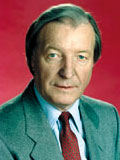The son of an officer in the original Irish Republican Army, Charles Haughey was educated at University College, Dublin, and King's Inns. Haughey was involved in real estate business and married (1951) the daughter of Taoiseach Séan Lemass. He was elected to the Dáil Éireann in 1957 from the Fianna Fáil party, becoming a parliamentary secretary to Justice Minister in 1961. Later that year he entered the Cabinet of Lemass as Minister for Justice himself. He was Minister for Agriculture (19641966) and for Finance (19661970) in the Cabinets of Lemass and Jack Lynch. In 1970 Lynch dismissed Haughey and Neil Blaney for not fully subscribing to government policy on Northern Ireland. Haughey was arrested and charged before the courts with conspiring to import arms illegally (May 1970), but a jury finally acquitted him of all charges. In 1973 Haughey regained his seat in the Dáil; Lynch bowed to party pressure and appointed Haughey Minister for Health and Social Welfare (1977-1979). After the resignation of Lynch, Haughey defeated George Colley for the post of party leader, and, after an acrimonious Dáil debate, was appointed Taoiseach (11 Dec 1979). His government failed to come to grips with serious problems in the public finances and he lost office after the 1981 General Election. Haughey's second nomination to the post of Taoiseach was rejected by the Dáil on 30 Jun 1981, and Garret FitzGerald formed his first administration. Haughey returned as head of government after the General Election in 1982. He led a minority Fianna Fáil administration for nine months. The previous coalition returned with a secure overall majority at another General Election in November 1982. A motion for Haughey's reappointment as Taoiseach failed (14 Dec 1982). Haughey had an undistinguished period as leader of the opposition but at the General Election of 1987 scraped back into power, once again leading a Fianna Fáil minority administration. That government was, perhaps, his most successful, especially in the progress it made towards restoring balance to the public finances. In 1989, frustrated by a number of minor parliamentary defeats, Haughey called a snap election, but Fianna Fáil lost four seats in the Dáil. Haughey failed to be nominated as Taoiseach on the first vote (29 Jun 1989), and was forced to enter a coalition with the Progressive Democrats. He was appointed Taoiseach for the fourth time on 12 Jul 1989. Early in 1992 his former Justice Minister Sean Doherty said that Haughey had been aware of phone taps on two political writers while Taoiseach in the brief 1982 government. Haughey denied this but, bowing to the inevitable, decided to resign (10 Feb 1992), and was succeeded by Albert Reynolds. Biography source: [2] |

